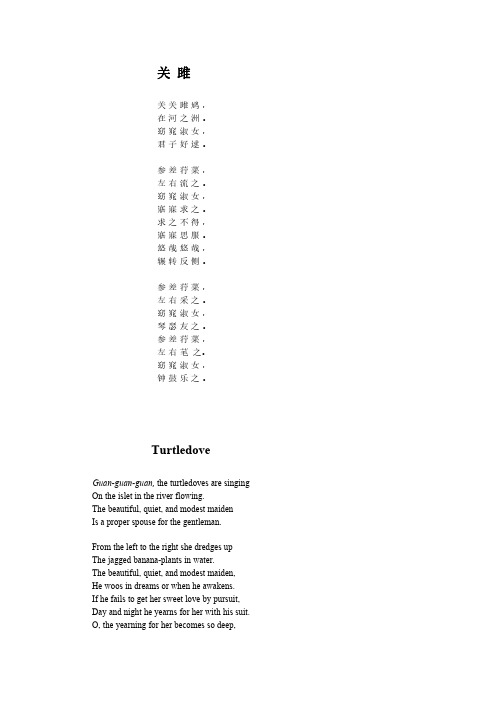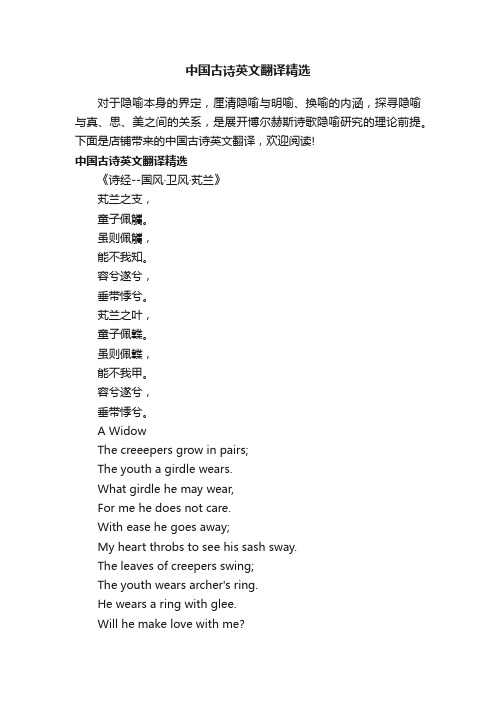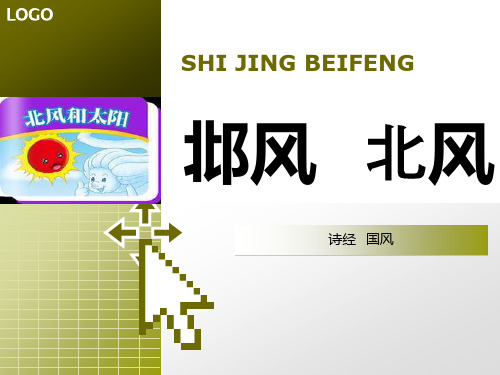诗经英文翻译及讲解
《关雎》英文翻译及中英文赏析

关雎关关雎鸠,在河之洲。
窈窕淑女,君子好逑。
参差荇菜,左右流之。
窈窕淑女,寤寐求之。
求之不得,寤寐思服。
悠哉悠哉,辗转反侧。
参差荇菜,左右采之。
窈窕淑女,琴瑟友之。
参差荇菜,左右芼之。
窈窕淑女,钟鼓乐之。
TurtledoveGuan-guan-guan,the turtledoves are singing On the islet in the river flowing.The beautiful,quiet,and modest maidenIs a proper spouse for the gentleman. From the left to the right she dredges up The jagged banana-plants in water.The beautiful,quiet,and modest maiden, He woos in dreams or when he awakens.If he fails to get her sweet love by pursuit, Day and night he yearns for her with his suit. O,the yearning for her becomes so deep,He tosses from side to side with no sleep.From the left to the right she gently plucksThe jagged banana-plants in water.Playing the stringed instrument and the harp,He makes friends with the quiet,modest maiden.From the left to the right she mildly picksThe jagged banana-plants in water.Playing the sound carillon and the drum,He pleases the quiet and modest maiden.赏析《诗经》是我国古代最早的一部诗歌总集,也是人类历史上最早的诗歌创作的一部分,共有305篇,包括从周初(公元前十一世纪)到春秋中期(公元前七世纪)约500年间的作品,其中大部分是经过整理的古人口头歌谣。
中国古诗英文翻译精选

中国古诗英文翻译精选对于隐喻本身的界定,厘清隐喻与明喻、换喻的内涵,探寻隐喻与真、思、美之间的关系,是展开博尔赫斯诗歌隐喻研究的理论前提。
下面是店铺带来的中国古诗英文翻译,欢迎阅读!中国古诗英文翻译精选《诗经--国风·卫风·芄兰》芄兰之支,童子佩觿。
虽则佩觿,能不我知。
容兮遂兮,垂带悸兮。
芄兰之叶,童子佩韘。
虽则佩韘,能不我甲。
容兮遂兮,垂带悸兮。
A WidowThe creeepers grow in pairs;The youth a girdle wears.What girdle he may wear,For me he does not care.With ease he goes away;My heart throbs to see his sash sway.The leaves of creepers swing;The youth wears archer's ring.He wears a ring with glee.Will he make love with me?With ease he goes away;My heart throbs to see his sash sway. 中国古诗英文翻译阅读《诗经--国风·卫风·氓》氓之蚩蚩,抱布贸丝。
匪来贸丝,来即我谋。
送子涉淇,至于顿丘。
匪我愆期,子无良媒。
将子无怒,秋以为期。
乘彼垝垣,以望复关。
不见复关,泣涕涟涟。
既见复关,载笑载言。
尔卜尔筮,体无咎言。
以尔车来,以我贿迁。
桑之未落,其叶沃若。
于嗟鸠兮,无食桑葚!于嗟女兮,无与士耽!士之耽兮,犹可说也;女之耽兮,不可说也。
桑之落矣,其黄而陨。
自我徂尔,三岁食贫。
淇水汤汤,渐车帷裳。
女也不爽,士贰其行。
士也罔极,二三其德!三岁为妇,靡室劳矣。
夙兴夜寐,靡有朝矣!言既遂矣,至于暴矣。
兄弟不知,咥其笑矣。
静言思之,躬自悼矣!及尔偕老,老使我怨。
中国古诗翻译成英文品析

中国古诗翻译成英文品析诗谶是鉴诗者将诗歌作品与诗人或相关人物命运相结合,以求诗歌与史实或本事互相印证的一种诗歌批评形式。
下面小编整理了中国古诗翻译成英文,希望大家喜欢!中国古诗翻译成英文品析《长恨歌》白居易汉皇重色思倾国,御宇多年求不得。
杨家有女初长成,养在深闺人未识。
天生丽质难自弃,一朝选在君王侧。
回眸一笑百媚生,六宫粉黛无颜色。
春寒赐浴华清池,温泉水滑洗凝脂。
侍儿扶起娇无力,始是新承恩泽时。
云鬓花颜金步摇,芙蓉帐暖度春宵。
春宵苦短日高起,从此君王不早朝。
承欢侍宴无闲暇,春从春游夜专夜。
后宫佳丽三千人,三千宠爱在一身。
金星妆成娇侍夜,玉楼宴罢醉和春。
姊妹弟兄皆列士,可怜光彩生门户。
遂令天下父母心,不重生男重生女。
骊宫高处入青云,仙乐风飘处处闻。
缓歌慢舞凝丝竹,尽日君王看不足。
渔阳鼙鼓动地来,惊破霓裳羽衣曲。
九重城阙烟尘生,千乘万骑西南行。
翠华摇摇行复止,西出都门百馀里。
六军不发无奈何,宛转蛾眉马前死。
花钿委地无人收,翠翘金雀玉搔头。
君王掩面救不得,回看血泪相和流。
黄埃散漫风萧索,云栈萦纡登剑阁。
峨嵋山下少人行,旌旗无光日色薄。
蜀江水碧蜀山青,圣主朝朝暮暮情。
行宫见月伤心色,夜雨闻铃肠断声。
天旋地转回龙驭,到此踌躇不能去。
马嵬坡下泥土中,不见玉颜空死处。
君臣相顾尽沾衣,东望都门信马归。
归来池苑皆依旧,太液芙蓉未央柳。
芙蓉如面柳如眉,对此如何不泪垂! 春风桃李花开日,秋雨梧桐叶落时。
西宫南内多秋草,落叶满阶红不扫。
梨园子弟白发新,椒房阿监青娥老。
夕殿萤飞思悄然,孤灯挑尽未成眠。
迟迟钟鼓初长夜,耿耿星河欲曙天。
鸳鸯瓦冷霜华重,翡翠衾寒谁与共? 悠悠生死别经年,魂魄不曾来入梦。
临邛道士鸿都客,能以精诚致魂魄。
为感君王辗转思,遂教方士殷勤觅。
排空驭气奔如电,升天入地求之遍。
上穷碧落下黄泉,两处茫茫皆不见。
忽闻海上有仙山,山在虚无缥缈间。
楼阁玲珑五云起,其中绰约多仙子。
中有一人字太真,雪肤花貌参差是。
金阙西厢叩玉扃,转教小玉报双成。
大明文王之什大雅诗经注释译文赏析英译版

原文+英译
• • • • • • • • • • • • • • • • 殷商之旅, 其会如林。 矢于牧野, 维予侯兴。 上帝临女, 无贰尔心。 牧野洋洋, 檀车煌煌, 驷騵彭彭。 维师尚父, 时维鹰扬。 涼彼武王, 肆伐大商, 会朝清明。 Yin sent troops grand, As thick as a woodland. On MU-ye King Wu did rally He said:"We’ll win the sally; God arms you with his clout, So free your mind from doubt.” MU-ye spread out vastly. The chariots shined brightly. Sturdy steeds galloped along, Shang-fu,great master Jiang, Was like an eagle on the wing Heassisted Wu,the king. They swooped on great Shang The war ended before dawn.
白话翻译
• 皇天伟大光辉照人间, 光采卓异显现于上天。 天命无常难测又难信, 一个国王做好也很难。 天命嫡子帝辛居王位, 终又让他失国丧威严。 太任是挚国任家姑娘, 也可以算是来自殷商。 她远嫁来到我们周原, 在京都做了王季新娘。 就是太任和王季一起, 推行德政有着好主张。
白话翻译
• 太任怀孕将要生儿郎, 生下这位就是周文王。 这位伟大英明的君主, 小心翼翼恭敬而谦让。 勤勉努力侍奉那上帝, 带给我们无数的福祥。 他的德行光明又磊落, 因此承受祖业做国王。 上帝在天明察人世间, 文王身上天命集中现。 就在他还年轻的时候, 皇天给他缔结好姻缘。 文王迎亲到洽水北面, 就在那儿渭水河岸边。
诗经 小雅 鱼藻 英语译文 (2)

诗经小雅鱼藻英语译文Title: English Translation of "Yu Zao" from the Book of Songs (Shi Jing)Introduction:The Book of Songs (Shi Jing) is an ancient Chinese collection of poems, songs, and hymns. Among its sections, the "Xiao Ya" (小雅) is known for its elegant and refined style. One of the poems in this section is "Yu Zao" (鱼藻), which depicts the beauty of aquatic plants. This article aims to provide an accurate and detailed English translation of "Yu Zao" from the Book of Songs.Content:I. Description of Aquatic Plants1.1 The significance of aquatic plants in ancient Chinese culture1.2 The diversity of aquatic plants in different environments1.3 The role of aquatic plants in maintaining ecological balanceII. Symbolism and Imagery in "Yu Zao"2.1 The metaphorical representation of aquatic plants as a symbol of virtue2.2 The use of imagery to describe the beauty and tranquility of aquatic plants2.3 The poetic devices employed to evoke emotions and create vivid imageryIII. Translation of "Yu Zao"3.1 Translating the title "Yu Zao" and its significance3.2 Interpretation of the poem's overall meaning and message3.3 Exploring the challenges of translating ancient Chinese poetry into EnglishIV. Cultural Significance of "Yu Zao"4.1 The influence of "Yu Zao" on later Chinese literature and art4.2 The role of "Yu Zao" in preserving ancient Chinese customs and traditions4.3 The appreciation of "Yu Zao" as a cultural heritage and its impact on modern societyV. Comparison with Other Translations5.1 Analyzing different English translations of "Yu Zao"5.2 Evaluating the accuracy and effectiveness of various translation approaches5.3 Discussing the challenges and limitations of translating ancient Chinese poetryConclusion:In conclusion, the English translation of "Yu Zao" from the Book of Songs provides a glimpse into the beauty of aquatic plants and the rich cultural heritage of ancient China. Through its symbolism, imagery, and poetic devices, the poem captures the essence of virtue and tranquility. The accurate translation of "Yu Zao" not only preserves the cultural significance of the poem but also allows readers from different cultures to appreciate its timeless beauty.。
《诗经》英文简介PPT

• 2 kinds: Greater Odes大雅, Lesser Odes小雅.
Introduction—Hymns
• No. 266-305
• It is divided into the Zhou hymns (周颂), Lu hymns ( 鲁颂), and Shang hymns (商颂), i.e., hymns from different dynasties (王朝), and the home state of Confucius. • Most of these are formal, ritual hymns that praise the ancestors envisioned (展望), in the rites (仪 式).
Origin—Zhou Dynasty (1111-249B.C.)
The book later became one of the six classics of the Confucian school(儒学). The fountainhead(源头)of Chinese literature. Poems are dated from 12th century to 7th century B.C. Many of their stylistic qualities go under modification until the time of Confucius (in late Zhou Dynasty).
Zhou Dynasty: history of over 800 years
Generally believed that agriculture began and developed in the Zhou Dynasty
诗经北风英文版翻译

北风其喈,雨雪其霏。惠而好我,携手同归。其虚其邪? 既亟只且!
莫赤匪狐,莫黑匪乌。惠而好我,携手同车。其虚其邪? 既亟只且!
Your site here
英译
North Wind North wind, sigh upon sigh,Blows snow, low and high. Friends, let’s go hand in hand As a united band.Don’t tarry nor delay,Let's hurry while we may! North wind, sough upon sough,Whirls snow, hard enow. Friends, let’s flee hand in hand As a united band.Don’t tarry or delay;Let's hurry while we may!
Crows are all black, it's said,So as foxes are red. Friends, let’s drive hand in hand As a united band. Don’t tarry nor delay;Let's hurry while we may!
Your site here
LOGO
Thank You!
LOGO
SHI JING BEIFENG
邶风 北 风
诗经 国风
作品介绍
北风凛冽,暴雪肆虐,贪官污吏、官二代、 富二代,把人逼到了死路。世间狐狸一色红, 天下乌鸦一般黑。朋友们,我们一起携手逃 跑吧。不要再犹豫了,情况紧急!钱云会被 出车祸了!村民、家人被和谐了。赶快逃吧。
绝妙英译秀:斯卡布罗集市的诗经版译文

绝妙英译秀:斯卡布罗集市的诗经版译⽂2008年07⽉30⽇ 12:06问尔所之,是否如适。
Are you going to Scarborough Fair?蕙兰芫荽,郁郁⾹芷。
Parsley sage rosemary and thyme.彼⽅淑⼥,凭君寄辞。
Remember me to one who lives there.伊⼈曾在,与我相知。
She once was a true love of mine.嘱彼佳⼈,备我⾐缁。
Tell her to make me a cambric shirt.蕙兰芫荽,郁郁⾹芷。
Parsley sage rosemary and thyme.勿⽤针砧,⽆隙⽆疵。
Without no seams nor needle work.伊⼈何在,慰我相思。
Then she will be a true love of mine.彼⼭之阴,深林荒址。
On the side of hill in the deep forest green,冬寻毡毯,⽼雀燕⼦。
Tracing of sparrow on snow crested brown.雪覆四野,⾼⼭迟滞。
Blankets and bed clothers the child of maintain眠⽽不觉,寒笳清嘶。
Sleeps unaware of the clarion call.嘱彼佳⼈,营我家室。
Tell her to find me an acre of land.蕙兰芫荽,郁郁⾹芷。
Parsley sage rosemary and thyme.良⽥所修,⼤海之坻。
Between the salt water and the sea strand,伊⼈应在,任我相视。
Then she will be a true love of mine.彼⼭之阴,叶疏苔蚀。
On the side of hill a sprinkling of leaves涤我孤冢,珠泪渐渍。
- 1、下载文档前请自行甄别文档内容的完整性,平台不提供额外的编辑、内容补充、找答案等附加服务。
- 2、"仅部分预览"的文档,不可在线预览部分如存在完整性等问题,可反馈申请退款(可完整预览的文档不适用该条件!)。
- 3、如文档侵犯您的权益,请联系客服反馈,我们会尽快为您处理(人工客服工作时间:9:00-18:30)。
青青子衿,悠悠我心。 纵我不往,子宁不嗣音? --《诗经·郑风·子衿》
它山之石,可以攻玉 《诗经·小雅·鹤鸣》 投我以桃,报之以李 《大雅·抑》 桃之夭夭,灼灼其华。之子于归,宜其室家。
《诗经·国风·周南·桃夭》 投我以木瓜,报之以琼琚。 《诗经·国风·卫风·木
瓜》 高山仰止,景行行止 《小雅·车辖》 一日不见,如三月兮。《国风·王风·采葛》
-
Famous lines
关关雎鸠,在河之洲。窈窕淑女,君子好逑。-《诗经·周南·关雎》
手如柔荑,肤如凝脂,领如蝤蛴,齿如瓠犀, 螓首蛾眉,巧笑倩兮,美目盼兮。--《诗经·卫 风·硕人》
死生契阔,与子成说。执子之手,与子偕老。-《诗经·邶风·击鼓》
知我者,谓我心忧;不知我者,谓我何求。悠 悠苍天!此何人哉?--《诗经·王风·黍离》
compiler of the book(“不读《诗》,无以 言”)
It has profound influence on the entire course of development of the Chinese literature (诗经传统)
-
Features
A collection of 305 poems (诗三百) written in a period of almost 500 years, starting from the early years of the Western Zhou through the mid-Spring-and-Autumn Period (c. 11th -6th c. BC)
-
Common artistic techniques: 赋 exposition 陈述,描写,介绍 比 comparison 比喻 兴 affective image 扰动情绪的意象
(objective correlative) written in a four-syllable meter elements of repetition and variation Parallelism
-
“At shooting you are good; I’ll dress the game as food. Together we’ll drink wine And live to ninety-nine. Lute and lyre by our side, In peace we shall abide.”
-
Significance
The earliest anthology of poetry in China one of the most significant headstreams
of Chinese literature Confucius is generally believed to be the
-
《诗经》
The Classic of Poetry
Book of Songs
Book of Odes
Book of Poetry
Shijing
-
General intro.
《诗》became《诗经》in Western Han, becoming one of the Five Classics (《周 易》、《礼记》、《尚书》、《春秋》)after that. (The Odes first became known as a jīng, or a "classic book", as part of the Han Dynasty official adoption of Confucianism as the guiding principles of Chinese society.)It has been studied and memorized by scholars in China and neighboring countries over two millennia.
Features (continued)
The songs fall into three sections: 风: feng, folk songs/ballads, local songs of 15 states 雅: ya, court hymns/ode 颂: song, sacrificial songs
Most of the songs and poems were anonymous, collected by royal officials from among ordinary people as folk songs and ballads.
Not titles
-
Spontaneous 情动于中
-
Two poems
-
女曰鸡鸣
女曰鸡鸣,士曰昧旦。 子兴视夜,明星有烂。 将翱将翔,弋凫与雁。
弋言加之,与子宜之。 宜言饮酒,与子偕老。 琴瑟在御,莫不静好。
知子之来之,杂佩以赠之。
-
知子之顺之,杂佩以问之。
The Wife Says, “Cocks Crow!”
Songs Байду номын сангаасf Zheng
The wife says, “Cocks crow, hark!” The man says, “It’s still dark.” “Rise and see if it’s night; The morning star shines bright. Wild geese and ducks will fly. Shoot them down from on high!”
Lecture 3
The Book of
Songs Sujie Li
School of English, BISU
2016-9-28
-
Famous Songs or lines from the Book
关雎 Cooing and Wooing 桃夭 Peach Blossoms Beam 氓 The Faithless Man 硕鼠 Large Rat 蒹葭 The Reed 黍离 Shuli (Passing the Millet field)
